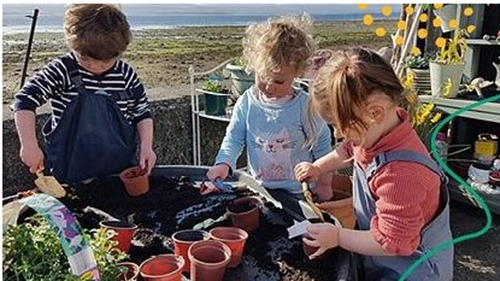New initiative aims to tackle challenges with rural childcare
As part of Childminding Week (9-15 May) Mili Shukla, Sector Manager for Health and Social Care at Skills Development Scotland, talks about the importance of childminding, the challenges faced in the childcare sector and the development of the new Scottish Rural Childminding Partnership.
I’m the national lead on sectoral skills planning and development for Health & Social Care at SDS. I work with industry, Scottish Government and other public agencies in the health and social care space and led on the development of the Early Learning and Childcare Skills Investment Plan (ELC SIP).

I also work with the Early Learning and Childcare Skills Group which brings together industry and delivery partners to provide strategic direction on skills issues and inform and influence future skills policy in the early learning and childcare sector. This group oversees the implementation of the ELC SIP.
Recently, I’ve been working with the Scottish Childminding Association (SCMA) – who represent the voice of childminders on our Skills Group – on a new innovative project to attract more people into childminding in rural areas.
We know that childminders play a very important role in the childcare sector, offering a home for home environment for children in their care and a unique experience for children and families. They look after children of all ages, for example, in a single setting a childminder could be caring for an infant, young children under 5 years of age, alongside older children of school age. Childminders also develop close relationships with the families they care for, offering important wider support to families within their community. The most recent data shows that 32,700 children were registered to receive childcare from childminders in 2018, representing 13% of childcare provision in Scotland*.
The childminding sector does however face challenges, some of which existed before COVID-19 and will continue beyond it. Research conducted by the SCMA shows that:
-
The childminding workforce has declined by 26.4% in the last 5 years. This decline has been recorded in every local authority area in Scotland with above average rates of decline reported in several remote and rural areas
-
The childminding workforce is an ageing workforce: 21% of the childminding workforce (or 1 in 5) are now aged 55
-
25% of childminders do not think they will still be childminding in 5 years’ time
Childminding not only provides benefits to children and families, but offers a rewarding career for childminders themselves. They see children grow and flourish as they learn and offer support to families when they need it.
SDS are delighted to be working with the SCMA on the Scottish Rural Childminding Partnership (SRCP) pilot project – this innovative project aims to support economic and community development through the creation of more than 100 new professional childminding jobs and up to 900 much-needed childcare spaces for families in remote and rural areas – a vital community asset in enabling parents and carers to work and contribute to the local economy. The project will be delivered in ten defined areas of Scotland, which have been identified as having an urgent need for more high-quality, flexible childcare. The areas are in Argyll & Bute, Dumfries & Galloway, Highland, Moray, North Ayrshire (Arran and Cumbrae), Orkney, Scottish Borders, Shetland, Stirling and Comhairle nan Eilean Siar (Western Isles).
The SRCP is a collaborative project led by the SCMA, with financial support from SDS, Highlands and Islands Enterprise (HIE), South of Scotland Enterprise (SOSE) and delivered locally in partnership with identified local authorities. The pilot is an important step towards addressing the urgent demand for high-quality childcare from parents and carers, recruiting childminders in areas where they are most needed. Rural and remote communities will benefit from this new initiative with the creation of an important service for families to enable more parents and carers to participate in training, work and education.
The SRCP will also provide opportunities for self-employment and business growth in remote and rural communities. Those who apply and are accepted will be supported by a dedicated member of the SCMA team, from induction training and support through the registration process to establishing their new business. On completion of registration with the Care Inspectorate and HMRC, the new childminder will receive a £750 start-up grant to help cover any costs associated with setting up their new business from home. They will also receive a unique package of childminding-specific skills and training courses.
Working in the childcare sector is a rewarding career for many, and one which provides the opportunity to contribute to children’s development, learning and wellbeing – and childminders are invaluable community assets especially in a rural and remote community.
More information on the target areas where new childminding businesses are needed, including eligibility and criteria is available at https://www.childminding.org/childminder-recruitment or by contacting childminder-recruitment@childminding.org
*Source: Care Inspectorate Early learning and childcare statistics 2018, September2019: https://www.careinspectorate.com/images/Early_learning_and_childcare_statistics_2018.pdf